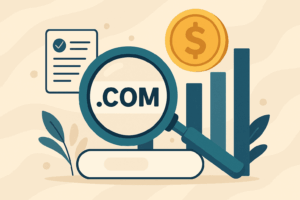Voice.com vs. Sex.com: Why Blockbuster Domains Are Not Created Equal

Yes, sex sells generally speaking but when it comes to domain names, things are a bit too complicated to be summed up through overly simplistic marketing gimmicks. In terms of anecdotal evidence worth referring to as a metaphor, we have the $30,000,000 Voice.com sale that Michael Saylor discussed during his DomainSherpa interview with Andrew Rosener on the one hand and the tumultuous trajectory of the Sex.com domain name with its $11,000,000 on the other.
Is there anything these two sales tell us about fundamental differences between domain names?
Most definitely.
It’s ultimately all a matter of understanding that as a domain investor, it’s paramount not to limit yourself to asking questions pertaining to the characteristics of the domain itself prior to making an acquisition: questions about its length, memorability, traffic if any and so on. When it comes to pretty much all imaginable metrics pertaining to the domain itself, there is absolutely no argument that can be made against the idea that Sex.com is the best of the best in terms of digital assets.
But strangely enough… well, it isn’t.
At least not anymore, not in 2020 and beyond.
I need to discuss the domain I own!
To comprehend why, it’s time to move on to another set of questions it makes sense to ask yourself prior to an acquisition, questions pertaining not to the domain itself but to potential end users. More specifically, yes, you are thinking about purchasing an excellent domain for $x with the intention of hopefully selling to a well-funded end user later on for multiple orders of magnitude more.
But who is that end user likely to be?
In the case of Voice.com, it isn’t the least bit difficult to think about a wide range of let’s say top-2000 companies with assets worth twelve figures on their balance sheets and impressive cash reserves which would be able to put the name to good use. From Amazon with Alexa to Google Voice and a wide range of blockbuster companies, Voice.com is the type of domain it is easy to envision in the hands of one of the most robust companies in the world.
Sex.com… not so much. While it is true that the adult industry is a force to be reckoned with and is definitely not going away anytime soon, there is absolutely nothing in the way of comparisons between let’s say the top players in the adult business and companies such as Google, Amazon or Apple for a wide range of reasons:
- As dominant as adult was in the nineties in terms of products the average user was willing to spend money on, the percentage of online commerce attributable to this industry has come down by multiple orders of magnitude since.
- Monetization represents a major hurdle in the adult space in light of the fact that the audience has been conditioned to receive free content. While it is true that the adult industry was and still is cutting edge in terms of innovative monetization solutions, this creativity alone is not enough to offset the free content-related mega-trend.
- Yes, sex is ubiquitous but as an entrepreneur who launches a project related to the industry in question, you have to accept that a bit of a shadow will be cast over your career and it will be difficult to escape it through future projects. To put it differently, for let’s say serial entrepreneurs in the VC space (to give an example of potential end users who aren’t exactly behemoths such as Google, Amazon or Apple), certain industries such as the adult business risk representing a bit of a deal breaker, for the simple reason that the individuals in question try to envision their career many years ahead and an adult-related project (even one with a blockbuster name such as Sex.com) risks creating more problems than it brings benefits.
To put it in simpler terms: the domain industry is maturing and the category killer landscape cannot help but adapt as well. Michael Saylor, Andrew Rosener and a wide range of other successful investors have mentioned on more than one occasion that we are still in the early stages of the internet and domain names are therefore severely underpriced at this point.
As a physical real estate-related example: in light of the fact that businesses spend billions upon billions on real estate projects that will enable them to conduct business offline, would it be that much of a stretch to assume that eventually, spending an amount north of $100,000,000 for a domain name such as Voice.com is unfathomable? Much to the irritation of “old school” marketers, there is quite a bit in the way of research which proves that household names oftentimes spend nine figures yearly on ad agency-recommended marketing approaches (anything from offline options such as billboards to online alternatives like AdWords or Facebook Ads) without much to show for it. To once again provide an interesting anecdotal evidence tidbit, Michael Saylor himself recalls spending roughly $20,000,000 on online advertising and essentially receiving pretty much nothing in the way of results.
Even if his campaign(s) would have been successful, there is yet another common denominator when it comes to spending a marketing budget as opposed to acquiring a premium domain: the fact that results on the marketing front are dependent on the company in question maintaining its ad spend. In stark contrast, a solid domain name that is acquired today can be kept indefinitely in exchange for a renewal fee that is in pocket change territory.
An investment in domain names therefore generates dividends indefinitely. For example, it is quasi-axiomatic by now that a good domain name provides a significant credibility boost to your brand, a credibility boost that leads to higher conversion rates no matter where you advertise. One marketing campaign at a time, companies that had the foresight it took to secure an excellent domain name will be able to save money, with their being no time limit whatsoever associated with this selling point.
The “Prestige” Factor?
It is difficult to find just one word which describes the reason why now as well as in the future, domain names such as Voice.com are likely to do better than Sex.com or generally speaking category killers in questionable industries from a branding perspective. Perhaps the best term one can use to describe this state of affairs is “prestige” because as the domain industry matures and an increasing number of sophisticated end users become motivated to secure a blockbuster domain name, the prestige factor ends up representing yet another selling point.
The implications as far as the future is concerned should be relatively straightforward to understand. To illustrate this with a practical example, one of the top mistakes made by beginners over the past ten years was acquiring memorable domain names but which had limited to no commercial appeal: sometimes because the term itself offered little to no obvious solution in terms of sales-oriented development, maybe the term on the left of the dot was overly negative/controversial. Regardless of the reason(s), the fact remains that buying a domain without analyzing it from a perspective of commercial viability has proven to be a mistake time and time again.
The same way, one of the top mistakes of the next decade, especially in terms of “the best of the best” inventory might be represented by the failure to factor in the prestige dimension. The mistake of not analyzing the specifics associated with the industry the domain name will more likely than not be used in and creating an end user stereotype in a way that helps you determine if the industry itself puts a ceiling on the domain from the perspective of potential.
No More Sex(.com)?
It would be irresponsible to end this article without clarifying an important aspect: just because domain names such as Sex.com tend to have a ceiling in terms of price due to their industry in 2020 and beyond, it doesn’t mean investors cannot do very well by investing in them. After all, while not a $30,000,000 sale, $11,000,000 is not exactly a drop in the bucket either.
The name of the game will most likely revolve around “adjusting for industry” and not being as generous on the acquisition front if the domain in question caters to the needs of an industry such as the adult one. In other words, investors who secure even the most controversial of domains associated with even the most controversial of industries can do very well if they were aggressive enough on the acquisition front and purchased said inventory at an extremely attractive price.
It’s ultimately all a matter of adjusting acquisition strategies in a manner consistent with the business world realities of 2020. Far from being the only game in town in terms of variables, the prestige factor is here to stay and deserves its place in pretty much any domain valuation model. Fair enough?



